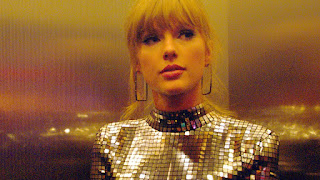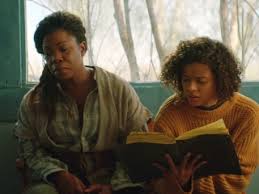I am not the biggest fan or follower of Taylor Swift. Everyone who knows anything about Pop music knows who she is though. They have heard a song or a scandal or more than likely multiples of both. She dates too much. She's a white feminist. The multiple interpretive identities of Taylor are out there to be consumed, chosen, and stuck to like glue.
And Taylor believes she's the rubber band for all of it.
Documentaries are difficult to review. If you are looking for a recommendation the real question is: do you care? I care about Music and therefore I care about Music documentaries. Taylor Swift's last two albums have been a defiant shift in a direction that feels better and more personal - to some degree. Personally, Reputation was a better album than Lover, which felt like she took the best of Reputation and the best of her older career and made a marriage of the two. Again, I'm not a big Taylor fan, I've just been exposed over time.
But the hard part about documentaries is that one assumes that they are there to tell objective facts. To present objectivity, not subjectivity of the subject at hand. And when one sits in front of a screen for ninety or more minutes while a variety of sources tell you something about things that are true or that they have opinions about, it makes a story that you either can or can't believe. In Miss Americana, that subject is Taylor Swift - and most likely you already have your opinion about whether or not you do believe her.
I am undecided. And watching the documentary did not help. At once, it shows a person - going about her day, making her music, and responding and thinking on the criticism's about her character that have gone around since she was seventeen years old. Success at a young age makes an incredible impression and the Pop industry is no stranger to taking young teenagers and turning them into early twenties sex symbols and radio stars. Taylor Swift was equally part and parcel of this machine. And much of the documentary follows her, raggedy makeup, hair in a tight ponytail, fiddling with her music and lyrics with a producer, friend, co-star, trying to just make this music that is her calling in life and has been since she was a little girl.
This is the part I like. This is the part that feels like a curtain is being pulled back. That there is something personally at stake for Swift in this documentary, that she's truly fighting a battle against being misunderstood and underheard throughout the years.
 I feel however, in painting this picture that Ms. Swift sells herself short precisely because she's acting in the role of a salesperson for much of the documentary.
I feel however, in painting this picture that Ms. Swift sells herself short precisely because she's acting in the role of a salesperson for much of the documentary.First it should be mentioned that a good portion of the documentary focuses on Taylor Swift's political advocacy, which is a recent move on her part and is more or less very strong and seen as the triumphant moment in the film. The moment when Swift throws off her bondage of being a pop singer and moves towards being socially active as a role model for her fans and audience. This despite the fact that she has expressed numerous views and philanthropic effort in regards to political positions throughout the past decade, including winning an award for a music video aimed at combating homophobia. While it was new for her to endorse a political choice, it's made as if Taylor Swift has somehow been a politically vanilla person until that choice, and that just isn't true.
Second when she picks and chooses songs she's making to show off in the film a lot of it comes from the far more normal sounding Lover album than the fiery rage filled Reputation album. It's really difficult to separate the idea that she created this documentary in part to show off Lover as the album where Taylor Swift has finally arrived at a mature expression of herself - although I'm fairly certain that's what the Reputation album had shown off. Even before that, it wasn't like Swift stopped making music whenever people questioned her dating, or when she got criticism from communities of people that agreed with Kanye.

These two positions just seem like stagings that benefit Swift in ways beyond just what the documentary is trying to say. I believe that Swift sees herself this way, but in dramatizing the moments beyond their impact, in choosing the weaker album, it makes it appear like more of an advertisement than it's meant to.
That brings me to my least favorite moment in the documentary. Taylor Swift receives the call regarding Grammy nominations for Reputation. It explains that she received only one nomination and it was not in any major category. This is meant to be like a defeat moment at the start before she wins for the rest of the documentary.
I'm sorry Ms Swift, but I don't feel bad for you. Not only are overblown industry awards like the Grammys and the Oscars not how you should personally track your success in the arts, but you also have unprecedented success to the tune of hundreds of millions of dollars in your personal networth. I get that each piece of art created is like a baby and you want people to like your baby. I just don't believe that Taylor cares so significantly about the criticism she receives when she's done nothing but publically and obviously push ahead and rarely miss a beat in publishing content and music. She has always possessed more steel than she expresses in this documentary.
I would've loved to see what Taylor Swift is - a passionate, dedicated woman who runs her own business, writes her own music, and crafts her image and sound to benefit her fans around the world. Instead, it seems like we must spend ninety minutes first believing what she thinks are her weaknesses (despite few of them really being weaknesses) and watching what she believes are her strengths.
So, do I feel like I wasted my time? No, of course not. I love music documentaries, I love every peek behind the scenes to how the music is made. I like listening to someone discuss a monstrous amount of public protest about themselves. I just don't have a lot of patience for the Kardashian-esque feel badding of a millionaire talking about how hard their lives have been. I don't like the feeling that she makes herself weaker to appeal to people. I don't like the feeling that she ignored a stronger more aggressive album for a more by the numbers appeal. I just do not see Taylor Swift the way she does.
And I suppose that in and of itself is her point. She sees herself this way and wants others to see that. But she's grown. She doesn't care as much anymore. That's why she made this documentary for you. Also Lover is out in stores now, look Brandon Urie is on it.
I think Taylor Swift should keep making her music. And honestly, if she wants to do more documentaries I would watch them also. I like Taylor Swift, I just don't always like what she's serving for dinner.
----
Taylor Swift's Miss Americana can be streamed on Netflix. Netflix doesn't offer affiliate programs for blogs like mine to make money sending them there. But you should have Netflix, after all they have The Crown and other shows I like. If you'd like to support the blog, try Amazon Music or buying Taylor Swift's Lover album - despite my analysis within this review it is definitely a quality album of pop music.




















